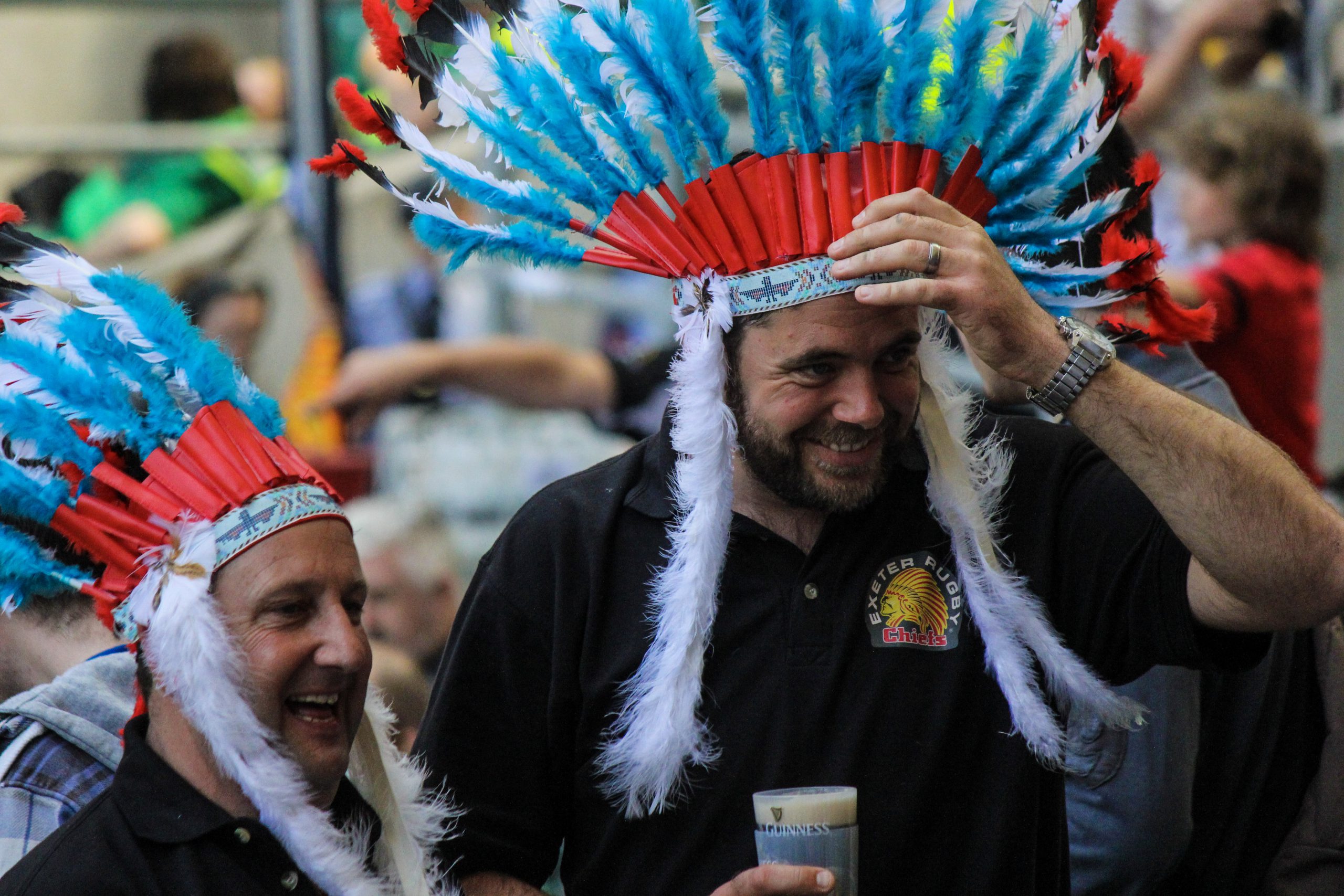Indianz.Com > News > Tony Perry: Racism against Native people is alive and well around the world
Exeter Chiefs rugby
An acceptable face of racism in the United Kingdom?
As the Exeter Chiefs rugby club celebrates two championships in as many weeks–the European championships and Premiership rugby championships–fans around the world celebrate the unlikely success of their team.
Just ten short years ago, the Chiefs joined Premiership rugby, the top ranks of rugby, and now they are victors over all. Sadly, not everyone feels the joy of Exeter’s triumph. Many Native Americans in the UK feel dismay and disgust for the club who claims to honour them.
In June, as the country reflected on it’s past with the #BlackLivesMatter movement, a group of Exeter fans called on their team to replace their Native American-themed mascot, logo and branding. Other teams, like the Washington R*dskins American football team, made this choice and these fans wanted Exeter to follow suit. They formed a group, called Exeter Chiefs for Change, and worked with Native Americans in the UK to better understand this issue and make the case for change.
When more than 4,000 supporters signed a petition by Exeter Chiefs for Change, the Exeter Chiefs Board considered the request. The Board chose to retire their mascot, “Big Chief”, but decided that their “logo was in fact highly respectful” and refused to change their logo and branding. The Board noted that they spoke with players and supporters around the world to reach their decision, but they failed to speak with those directly affected: Native Americans. The Exeter Chiefs perpetuate a long, dark history of racism against Native Americans. They also raise questions about their own identity. As Philip Deloria argued in his book Playing Indian, early settlers to what became the United States used Native mascots to affirm their identity as being not British, but something different. Native Americans represented a sense of freedom and idyllicism that the colonists longed for in their new lives in their new home. Native American mascots have also affirmed a sense of “progress” by colonists, celebrating their efforts to erase the rich and complex histories and identities of Native Americans. Mascots frame Native Americans as peoples of the past, symbols of a bygone era consumed in the onward march toward the Americans’ “manifest destiny” to settle and “civilise” the land they occupied. This march to progress saw many Native Americans removed from their Homelands and forced to assimilate into the lives of their oppressors.We're still yet to see this ripple effect move @ExeterChiefs to do the right thing! Support our campaign asking the club to change its branding:
— Exeter Chiefs For Change (@ExChiefs4Change) November 17, 2020
👍 Like & share our posts
🖊 Sign our petition https://t.co/W1aRmWTjrp
🗣 Talk to friends & family
➡️ Share your ideas for a new brand https://t.co/OWRnUQ2bsl


Tony Perry is a citizen of the Chickasaw Nation living in England. He is also author of Chula the Fox, an award-winning historical fiction book about Chickasaw life in the early 1700s.
Search
Filed Under
Tags
More Headlines
Press Release: National Museum of the American Indian hosts Native art market
AUDIO: Sea Lion Predation in the Pacific Northwest
Native America Calling: Tribal colleges see an uncertain federal funding road ahead
Native America Calling: Short films taking on big stories
Native America Calling: Advocates push back against new obstacles to Missing and Murdered Indigenous Relatives momentum
Native America Calling: For all its promise, AI is a potential threat to culture
NAFOA: 5 Things You Need to Know this Week (November 24, 2025)
Chuck Hoskin: Cherokee Nation invests in rural transportation
Native America Calling: Native candidates make strides in local elections
National Congress of American Indians returns incumbents and welcomes newcomers to leadership
National Congress of American Indians chooses leadership at big convention
‘Not voting is still a vote’: Native turnout drops amid changes in political winds
Native America Calling: Indigenous voices speak up, but have little clout at COP30
‘It’s bull****’: Indian Country confronts challenges at largest inter-tribal conference
Native America Calling: The constant burden on tribal hunters to justify their treaty rights
More Headlines
AUDIO: Sea Lion Predation in the Pacific Northwest
Native America Calling: Tribal colleges see an uncertain federal funding road ahead
Native America Calling: Short films taking on big stories
Native America Calling: Advocates push back against new obstacles to Missing and Murdered Indigenous Relatives momentum
Native America Calling: For all its promise, AI is a potential threat to culture
NAFOA: 5 Things You Need to Know this Week (November 24, 2025)
Chuck Hoskin: Cherokee Nation invests in rural transportation
Native America Calling: Native candidates make strides in local elections
National Congress of American Indians returns incumbents and welcomes newcomers to leadership
National Congress of American Indians chooses leadership at big convention
‘Not voting is still a vote’: Native turnout drops amid changes in political winds
Native America Calling: Indigenous voices speak up, but have little clout at COP30
‘It’s bull****’: Indian Country confronts challenges at largest inter-tribal conference
Native America Calling: The constant burden on tribal hunters to justify their treaty rights
More Headlines